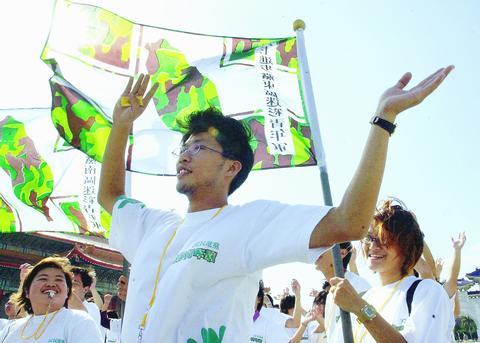The DPP's election campaign heated up yesterday afternoon as enthusiastic young members declared themselves devoted to the party during a campaign rally at the Chiang Kai-shek Memorial Hall.
The DPP's Youth Development Department launched the "DPP Youth Camouflage Corp" with the goal of promoting party candidates.

PHOTO: FANG PIN-CHAO, TAIPEI TIMES
The "camouflage corporation" was divided into four teams from northern, central, southern and eastern Taiwan. Team members consist of at least 200 students from more than 60 colleges nationwide. They call themselves "democracy protectors of generation `e'" (younger than generation X and better connected electronically) and will do whatever it takes to stop "black-gold" politics.
"The DPP is a young political party," said Wu Nai-jen (吳乃仁), the DPP secretary general. "We love to give young people chances and let them show their passion and enthusiasm for politics. We encourage the younger generation to give it a shot and participate in political activities instead of being afraid of making mistakes."
DPP staff members Hsiao Bi-khim (
The KMT launched a similar group of young people eight days ago called the "KMT Youth Corp" to campaign for the party. Unlike the DPP's rally yesterday, the KMT's young members campaigned on their scooters.
The DPP has nominated ten candidates to run for legislative seats in Taipei City constituencies.
The five candidates for the city's northern constituency are Luo Wen-chia (羅文嘉), the former vice chairman of the Council for Cultural Affairs; former National Assembly Representative Lan Shih-tsung (藍世聰) and incumbent legislators Wang Hsueh-feng (王雪峰), Lin Chung-mo (林重謨) and Cho Jung-tai (卓榮泰).
The five candidates for the southern constituency are Taipei City councilors Tuan Yi-kang (段宜康), Chou Po-ya (周柏雅) and Lan Mei-chin (藍美津); political analyst Julian Kuo (郭正亮) and incumbent lawmaker Shen Fu-hsiung (沈富雄).

ACTION PLAN: Taiwan would expand procurement from the US and encourage more companies to invest in the US to deepen bilateral cooperation, Lai said The government would not impose reciprocal tariffs in retaliation against US levies, President William Lai (賴清德) said yesterday, as he announced five strategies to address the issue, including pledging to increase Taiwanese companies’ investments in the US. Lai has in the past few days met with administrative and national security officials, as well as representatives from various industries, to explore countermeasures after US President Donald Trump on Wednesday last week announced a 32 percent duty on Taiwanese imports. In a video released yesterday evening, Lai said that Taiwan would not retaliate against the US with higher tariffs and Taiwanese companies’ commitments to

‘SPECIAL CHANNEL’: Taipei’s most important tasks are to stabilize industries affected by Trump’s trade tariffs and keep negotiations with Washington open, a source said National Security Council Secretary-General Joseph Wu (吳釗燮) arrived in the US for talks with US President Donald Trump’s administration, a source familiar with the matter said on Friday. Wu was leading a delegation for a meeting known as the “special channel,” the Financial Times reported earlier. It marked Trump’s first use of the channel since returning to the White House on Jan. 20. Citing a source familiar with the matter, the Financial Times reported that Minister of Foreign Affairs Lin Chia-lung (林佳龍) was also a part of the delegation. The visit came days after China concluded war games around Taiwan and amid Trump’s

CHIP EXCEPTION: An official said that an exception for Taiwanese semiconductors would have a limited effect, as most are packaged in third nations before being sold The Executive Yuan yesterday decried US President Donald Trump’s 32 percent tariff on Taiwanese goods announced hours earlier as “unfair,” saying it would lodge a representation with Washington. The Cabinet in a statement described the pledged US tariffs, expected to take effect on Wednesday next week, as “deeply unreasonable” and “highly regrettable.” Cabinet spokeswoman Michelle Lee (李慧芝) said that the government would “lodge a solemn representation” with the US Trade Representative and continue negotiating with Washington to “ensure the interests of our nation and industries.” Trump at a news conference in Washington on Wednesday announced a 10 percent baseline tariff on most goods

Intelligence agents have recorded 510,000 instances of “controversial information” being spread online by the Chinese Communist Party (CCP) so far this year, the National Security Bureau (NSB) said in a report yesterday, as it warned of artificial intelligence (AI) being employed to generate destabilizing misinformation. The bureau submitted a written report to the Legislative Yuan in preparation for National Security Bureau Director-General Tsai Ming-yen’s (蔡明彥) appearance before the Foreign Affairs and National Defense Committee today. The CCP has been using cognitive warfare to divide Taiwanese society by commenting on controversial issues such as Taiwan Semiconductor Manufacturing Co’s (TSMC, 台積電) investments in the